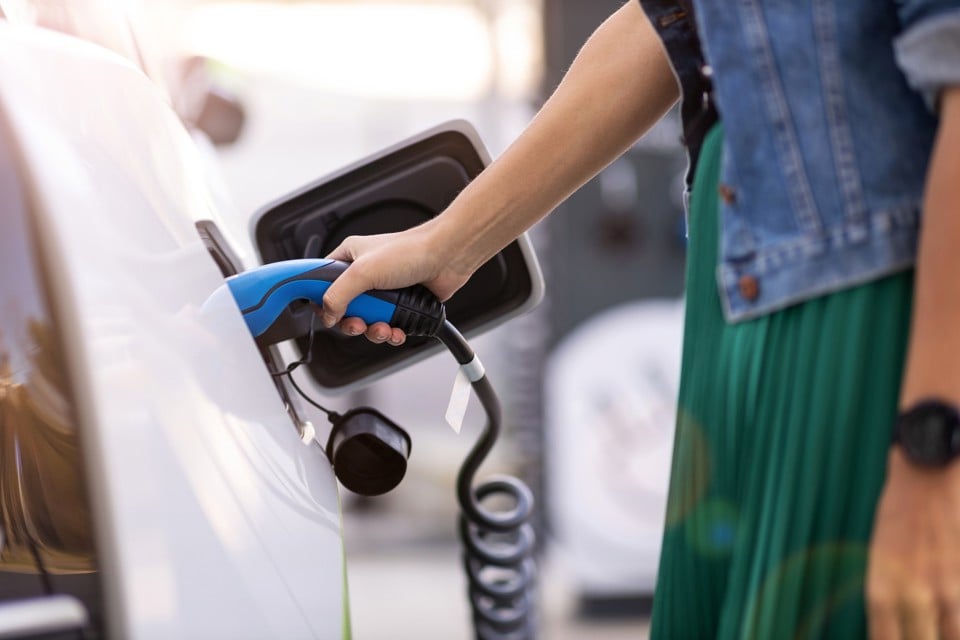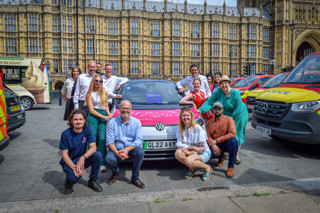Plans for the decarbonisation of transport could be thwarted if the Government decides to increase company car tax rates for electric vehicles (EVs).
A zero-percentage benefit-in-kind (BIK) tax rate for pure electric cars, introduced in 2020 (since risen to 2%), has helped thousands of company car drivers make the switch.
However, the fleet industry fears that an increase in BIK rates could threaten the UK’s target of reaching net zero by 2050.
Through its #SeeTheBenefit campaign, the British Vehicle Rental and Leasing Association (BVRLA) is calling for clarity on company car taxation and a forward view of rates beyond 2024-25.
Supporting the BVRLA campaign, Paul Hollick, chair of the Association of Fleet Professionals (AFP), said: “Everything in our industry is driven by tax and the amount of money in the driver’s pocket. If we start to unbundle the cost equation around electric vehicles making sense for the driver, they’re going to talk with their feet.”
Hollick believes the Government can’t afford to stifle the fleet uptake of battery electric vehicles (BEVs), given it wants to reach net zero by 2050.
“The corporate sector is leading the charge as a result of low company car tax rates,” he said. “However, if you look at the SMMT (Society of Motor Manufacturers and Traders) data, we are still very much in the early adopter phase, particularly with retail.
“You don’t want to mess with the ecosystem too much if you’re wanting to try to drive that agenda forward.”
The need to keep the used car market well-stocked with electric cars will also be critical to the powertrain becoming mainstream. “But that won’t happen if there’s not more electric volume coming into the new car market, which is already suffering from long lead times,” said Hollick.
There were more than 530,000 battery electric cars on UK roads at the end of August, which equates to one in every 61 cars registered in the UK.
Last year alone, more than 395,000 zero-emission cars were registered, up 92% on 2020.
Natalia Peralta Silverstone, head of propositions at Octopus Electric Vehicles, says that in recent years, incentives to make the switch – such as favourable tax policies – have played a vital role.
She added: “Until we reach price parity with gas-guzzling cars, mobilising the UK workforce and fleets towards EVs will be vital to achieving our net zero goals.”
FSN SURVEY RESULTS
The fleet industry’s crucial role in the burgeoning market was illustrated in a Fleet200 Strategy Network (FSN) survey, carried out by Fleet News.
The FSN survey showed respondents have already reduced the diesel mix of their car fleets to almost half (54%). As recently as 2018, Fleet200 figures show that diesel stood at more than 80%.
Fully electric accounted for more than one-in-10 company cars (11%) – up from 1.9% four years ago. Plug-in hybrids accounted for one-in-eight (12.4%).
Forward order books show the fleet industry’s grip on the EV market is tightening, with two-in-five orders (39%) for a fully-electric company car.
Just 14% are diesel, with the proportion slightly higher among companies operating smaller fleets.
BVRLA director of communications Toby Poston says the trade body’s latest data also shows electric is now the most popular ‘fuel’ type of new vehicles coming to the leasing fleet.
He describes it as a “watershed moment”, which would have not been possible without low BIK rates on EVs.
As part of the #SeeTheBenefit campaign, the BVRLA is asking fleet professionals to write to the new Chancellor urging him to keep company car tax rates low.
Claire Evans, fleet consultancy director at Zenith, which is supporting the campaign, says fleets have “led the way” in the transition to EVs and “the current tax regime has played a vital part in giving operators and drivers the confidence to embrace these vehicles”.
For this to continue, she added: “The Government needs to give fleets assurances that the support will remain in place as, undoubtedly, the next batch of vehicles and drivers will be the ones where there are more perceived hurdles to adopting an EV.”
Jon Lawes, managing director of Novuna Vehicle Solutions, says low BIK rates are also key to the carbon reduction strategies of companies. However, he told Fleet News: “Faced with unprecedented challenges including surging energy costs, the uncertainty of what lies ahead threatens to undermine confidence for fleets to continue to make the switch.
“Lower benefit-in-kind tax rates have been a highly effective, key incentive driving the momentum we’ve seen towards EV adoption up until this point.
“With fleets continuing to lead the EV revolution, favourable tax policies, alongside a step change in charging infrastructure, remain pivotal in order to deliver the roadmap to zero emissions mobility.”
Earlier this summer, the #SeeTheBenefit campaign took its case to Parliament, with experts from the BVRLA, Octopus Electric Vehicles, Tusker and Zenith giving MPs a briefing on why it is important to maintain low company car tax rates for EVs and provide employees with a route to electrification through salary sacrifice.
Tusker says it saw “fantastic” EV adoption rates when the zero percentage BIK rate was introduced in 2020, but for this to continue, drivers need some reassurance from the Treasury on what rates will be in 2026 and beyond.
More ‘cash for car’ drivers are taking advantage of salary sacrifice, because it offers a fixed price, inclusive car, enabling employees to access an EV more cost effectively than if they were to buy or lease the car as a retail driver, it explains.
This also helps companies address grey fleet issues as it reduces the number of drivers using their own car on company business.
The Government is a fan of salary sacrifice, according to Hollick. “It is there to drive an agenda and to try and drive behavioural change.”
However, he said: “I think the problem, particularly with cars, is that the Government is missing out on a lot of tax.”
It is a point not lost on Treasury, which does not support salary sacrifice schemes for civil servants, telling Fleet News that such transactions are not “ordinarily a sound way of using public funds, nor do they represent best value for the Exchequer as a whole”.
STANCE SOFTENING
Sources have suggested, however, that it may be softening its stance, rather than looking to clamp down on the benefit, with salary sacrifice proving extremely popular in the public sector.
Prior to the introduction of low BIK rates for electric cars in 2020, the Zenith salary sacrifice fleet was less than 5% EV.
Now, one-in-two vehicles are electric and more than 80% of salary sacrifice orders are for electric cars. Evans said: “To ensure all drivers have the confidence to make the switch to EV in a time of inflationary pressure, providing long-term certainty over tax rates is also important, with fleet cars typically being ordered on a three- or four-year term.”
Silverstone agreed, telling Fleet News: “Drivers deserve transparency and security when committing to three- or four-year lease agreements.
“Low benefit-in-kind rates should be extended – it is the single biggest driver of EV uptake today, allowing individuals to make the switch through salary sacrifice and for fleets to go zero emissions faster.
“If we’re serious about supercharging the EV transition and reaching net zero, drivers and companies are going to need that peace of mind.”
GRADUAL INCREASE
Fleets know future BIK rates up to March 2025, with the current annual percentage rate for a zero-emission company car remaining at 2% year-on-year for the next three tax years.
“What we’re looking for is a gradual increase year-by-year,” said Hollick. “We don’t want to see the tax tables in 2025-26 go up to 10%.”
Hollick argues that, with EVs more expensive than their internal combustion engine (ICE) equivalents, the company car market could not sustain a big jump in BIK.
“In a typical ICE equation, once a company car starts to attract more than a 15% BIK tax rate, the driver starts thinking about whether they want a company car or not,” he explained.
“Balancing that equation will be a lot lower for an EV, because of the capital cost of the vehicle.
“Once you start paying 10%-11%, drivers will start thinking that’s a lot of tax to pay, maybe I should go off and do my own thing, and the last thing you want them to do is go off and get a second-hand ICE vehicle with their cash.”
The new Prime Minister, Liz Truss, has appointed Kwasi Kwarteng as Chancellor of the Exchequer, replacing Nadhim Zahawi whose time in the role totalled two months.
Kwarteng delivered a mini-Budget to outline how the Government intends to pay for measures to tackle the cost-of-living crisis, including the ‘energy price guarantee’, on Friday, September 23.
A regular Budget, describing the current state of the economy and what the Government intends to do about factors such as tax, pay, spending and investment, including any announcement around company car tax, will take place on November 23.
The fleet industry will be hoping the Chancellor can maintain tax incentives for EV company car drivers, particularly as the latest HMRC figures showed a 10% year-on-year decline in those receiving the benefit.
Read more from BVRLA director of corporate affairs, Toby Poston, on why a supportive tax environment is critical to maintaining EV adoption rates.
























Login to comment
Comments
No comments have been made yet.